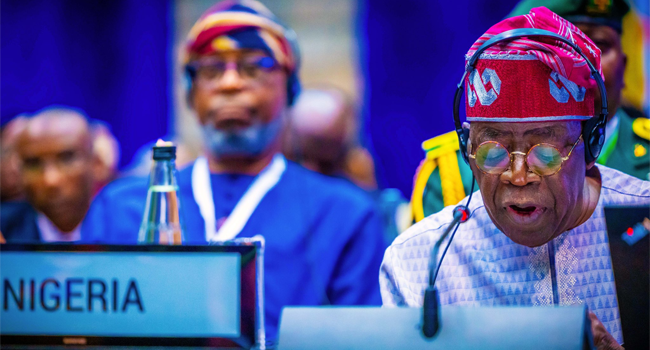President Bola Tinubu’s speech at African Union Coordination Meeting in Kenya
16th July 2023 10:04 PM ![]()

• Your Excellency President Azali Assoumani, Chairperson of the
African Union;
• Your Excellency William Ruto, President and Head of State of
the Republic of Kenya;
• Your Excellency Musa Faki Chairperson of the African Union
Commission;
• Excellencies Heads of State and Government;
• Excellencies Heads of the Regional Economic Communities;
• Excellencies the Vice President and AUC Commissioners;
• Distinguished Heads of Regional and Continental Institutions;
• Excellencies Members of the Diplomatic and Consular Corps;
• Ladies and Gentlemen
1. In my capacity as the Chairperson of the ECOWAS Authority of Heads of State and Government, I am honoured to participate, for the first time, in the Mid-Year Coordination Meeting of the African Union (AU) and the Regional Economic Communities. On behalf of ECOWAS member States and Institutions, I would like to express our gratitude to the African Union for sustaining the efforts to strengthen collaboration and coordination between the Continental Union,the Regional Economic Communities (RECs) and Regional Mechanisms (RM).
Let me also thank the Government and people of the Republic of Kenya for hosting the meeting and placing excellent facilities at our disposal. My delegation is particularly appreciative of the excellent courtesies accorded to us since our arrival in this beautiful city of Nairobi. Excellencies, Distinguished Ladies and Gentlemen,
2. Allow me to present to you the efforts that our regional economic community, ECOWAS, has deployed in the areas of trade, free movement of persons, investment, infrastructure, energy as well as in peace, and security.
Trade
3. Trade remains the backbone of our integration. Although the Free Trade Area has been attained in ECOWAS, the Customs Union and Common Market have yet to be fully realised. Intra Community trade remains low at around 12%. The main products traded across our region remain minerals, food and industrial products.
There is a great disparity between member States in terms of capacity to contribute significantly to intra-regional trade ranging, from 2% for Cabo Verde to 43% for the Gambia. On the other hand, trade with third parties constitute the bulk of our external trade. The European Union continue to be the major external trading partner of the region, followed by Asia, North America, and the rest of Africa. On average, the region’s trade in goods with European Union stands at $34.5 billion. The region’s trade stands at $27.0 billion with Asia and $9.8 billion with the United States of America.
However, informal trade in the region is significant and appears to be growing. The major item of informal exchanges are food stuff, livestock, fuel, and manufactured consumer goods.
4. ECOWAS has been working to consolidate the gains of its trade liberalisation scheme and to enable the private sector to take advantage of the opportunities provided by the African Continental Free Trade Area (AfCFTA). The ECOWAS Commission has been supporting its Member States in the negotiations, ratification, and implementation of the AfCFTA. To date, 13 out of the 15 ECOWAS Member States have ratified the AfCFTA.
ECOWAS is also supporting its Member States to finalise their Draft Schedule of Specific Commitment (DSSC) as part of the negotiations on the five (5) Priority Sectors in Trade in Services. In my capacity representing ECOWAS and capacity as Nigeria’s head of state, I affirm we shall keep faith with this year’s theme: Acceleration of the African Continental Free Trade Area Implementation.
Establishing the African free trade area has been a historic achievement, opening the door to continental economic growth and unity and nurturing the brave optimism that comes with these benign goals.
5. As Africans, we forge ahead no matter the barriers thrust before us. The world we inhabit is often unkind and uncertain. Past history and current global difficulties argue against our future success. Lessons of the past few years teach us that the world economy can be disrupted in ways that halt progress and invite downturn.
Our nations can suddenly find themselves in dire situations if we choose to be passive observers of our fate. Such passivity does not commend itself to me. I will not listen to it. Neither should any African. The challenges we face mean that governance will be difficult. They also mean that visionary good governance is necessary. Some observers assert a new scramble for Africa is afoot and it is much like the old scramble that plundered our continent.